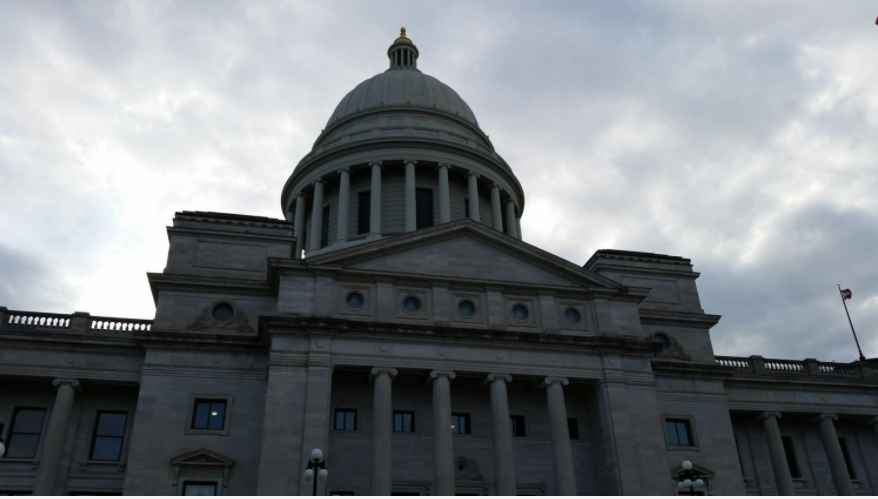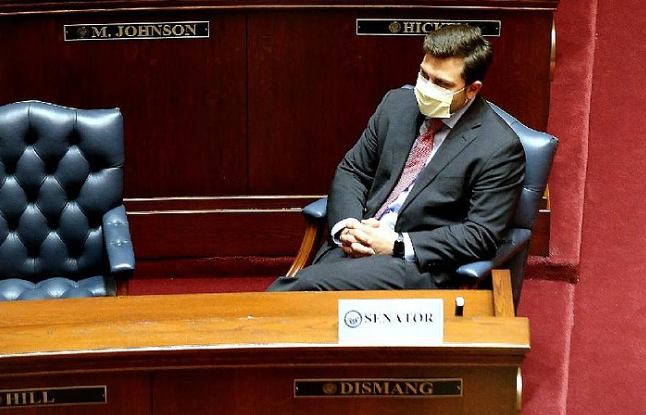
Harvest Time Academy, one of 170 private schools in Arkansas serving nearly 27,000 students, endeavors to provide an atmosphere where the word of God is preeminent in every subject throughout the school day.
Editor’s note: This article appeared last week on Arkansas’ kark.com.
The 2023 legislative session is right around the corner in Arkansas, and lawmakers are discussing some important topics that will be on the agenda.
One focus of the upcoming session is on education according to Sen. Bart Hester, president of the Senate Pro Tempore. Much of the conversation surrounding education is specifically centered around school choice.
“We’re going to work on educational freedom, and that’s for every kid in Arkansas,” Hester said. “Our biggest priority in Arkansas is parental empowerment through choice.”
Sen. Joyce Elliott is leaving the Legislature once the 2023 session rolls around, however she said she still believes the focus needs to be more on public schools rather than school choice.
“We can do better if we decide to,” Elliott said. “It’s about priorities.”
Hester said this session, lawmakers could consider ways to get certain students out of their zoned district, if needed for those students, and send them to private schools through scholarships.
He said his focus is on educating a child rather than protecting an institution: “I want to focus on money following a child and educating a child not supporting some institution.”
To continue reading, click here.

Arkansas legislators approved the state’s first voucher program in 2015. In April, they passed a $2 million tax credit voucher program that will provide a full tax credit to individuals and corporations who donate to a fund that will pay private school tuition for families with incomes up to 200% of the federal poverty level.
Editor’s note: This commentary from Arkansas State Rep. David Ray appeared last week in the Arkansas Democrat Gazette.
Much has been written about education being the defining issue in this month's Virginia gubernatorial election between Democrat Terry McAuliffe and Republican Glenn Youngkin.
Youngkin, a businessman with no prior political experience, pulled off an upset that few saw coming in a state that has trended strongly toward the Democrats in recent years. He did so in large part by appealing to parents who are dissatisfied over the current state of public education.
Parents were upset by many factors, including the prolonged school closings, even as most of society has returned to some measure of pre-pandemic normal. They were upset that teachers' unions resisted a return to in-person instruction, even though students had experienced tremendous learning loss throughout the pandemic.
On top of that, many parents were disturbed by the injection of left-wing politics into their kids' education. The reported teaching of critical race theory and a letter from the National School Boards Association to President Biden essentially accusing concerned parents of being potential domestic terrorists only added fuel to the fire.
Virginia's recent elections are a strong reminder that states need to give parents more choices in education. In addition to their local traditional public schools, parents and children need the ability to choose an environment that meets their individual needs for a whole host of reasons (academic, values, bullying, learning disabilities, etc.).
To continue reading, click here.

Compass Academy in Conway, Arkansas, is a private, non-profit school for children with developmental disabilities or those with difficulty adjusting to a public school setting. It provides full-time, year-round education for students age 5 and up and participates in the state’s Succeed Scholarship Program.
Like many parents of a child with special needs, Erica Boucher was frustrated at the lack of educational options available for her son Hayden. Diagnosed with autism, Hayden was labeled a “bad child” by school administrators who concluded that his difficulty in the classroom stemmed from Boucher not disciplining him enough.
The former preschool teacher and mother of five was thrilled to learn that her home state of Arkansas participates in the Succeed Scholarship Program, which opens the door for students with learning disabilities to attend state-approved private schools. Boucher reports that Hayden’s behavior has improved at his new school, Compass Academy, and that he has begun to move forward academically.
Says Boucher:
At Compass, they know how to help students with autism and learning disabilities cope with their conditions. They don’t punish Hayden — they help him. When he has a stimming episode, they know how to help him calm down and then let him return to his desk. They understand when he has a hard day with autism and don’t hold it against him later. Every day is a new day.
Boucher recently told her story to Project Forever Free. You can read it here.

Senate Bill 680, introduced by Republican Sen. Jonathan Dismang, passed in the Arkansas House on a 52-40 vote.
Add yet another state to the list of those whose legislatures are supporting the expansion of education choice this year: Arkansas.
The Arkansas House last week approved a $2 million state income tax credit program to fund private school scholarships for low-income students. Senate Bill 680 passed in the House on a 52-40 vote after an hour of debate.
The legislation would create the Philanthropic Investment in Arkansas Program, providing scholarships for about 250 students whose family income is less than or equal to 200% of the federal poverty level. That amounts to $53,000 a year for a household of four.
House sponsor Rep. Ken Bragg, R-Sheridan, said public schools serve most students well, but some need resources their families can't afford, and SB680 would help that relatively small number of children.
"There's always exceptions where a child might need a different educational experience," Bragg said. "Lower-income families don't have the ability to take advantage of the options that most of us in this chamber have."
Other legislators who spoke in support of the bill recounted the positive impacts of private schools in their lives and in the lives of their children and grandchildren.
"This is a small, minuscule, tiny amount to help some kids in our state that are not going to have the chance otherwise," said Rep. Mary Bentley, R-Perryville.
The bill is awaiting Gov. Asa Hutchinson’s signature. Hutchinson, a Republican, is supportive of the bill and plans to sign it according to a spokeswoman.
Kansas: Lawmakers are pushing for two new bills, which include recommendations from the National Alliance of Public Charter Schools, to bring the school choice movement to a state with only 15 charter schools (The Topeka Capital-Journal).
Georgia: Proposed legislation looks to cap the state's private-school tax credit program and limit it to students with a financial need (Atlanta Journal Constitution). A parent-trigger bill that paves the way for traditional public schools to convert to charters also gets a nod from legislators (Atlanta Journal Constitution).
 New Hampshire: The House is set to vote on a measure that could end a Board of Education moratorium on charter schools (New Hampshire Union Leader). More from The Telegraph of Nashua.
New Hampshire: The House is set to vote on a measure that could end a Board of Education moratorium on charter schools (New Hampshire Union Leader). More from The Telegraph of Nashua.
Tennessee: A $4 million Mathematica study finds KIPP students show significant learning gains in reading, math, science and social studies in the first four years (The Commercial Appeal).
Alabama: State school board members offer mixed reactions following the surprise passage of the Alabama Accountability Act, which gives tax credit scholarships to parents who want to remove their children from failing public schools and enroll them in private schools or a non-failing public school (AL.com). Also, a circuit judge blocked the signing of a controversial bill that created tax credit scholarships (The Anniston Star). (more…)
 New York: More than 1,000 charter school parents rally in Albany to convince the state to let charter schools compete for state funding for pre-K (Fox23 News).
New York: More than 1,000 charter school parents rally in Albany to convince the state to let charter schools compete for state funding for pre-K (Fox23 News).
Montana: Lawmakers hear from parents and other child advocates who want their state to open charter schools and support giving families more choices, such as tax credits (Great Falls Tribune). Bills to create a tax credit scholarship program pass out of committees on mostly party line votes (Helena Independent Record). More from the Billings Gazette.
Ohio: Half the students in the state would be eligible for private school vouchers under an expansion proposed by Gov. John Kasich to include all low-income children (ClevelandLeader.com).
Texas: House Speaker Joe Straus warns the Senate that it might not want to go "full bore'' on a school voucher bill, calling it an "exercise in futility'' (Dallas Morning News). Four groups aiming to open charter schools next year turn in applications that have material copied from other applications (Dallas Morning News).
Florida: The Florida House approved a bill that makes it easier for charter schools to grow, but calls for increased accountability (redefinED). The bill also gives charters greater access to district facilities, something one school official said would be a "logistical nightmare" (Palm Beach Post). More from Tallahassee Democrat. Private schools can apply to administer the FCAT, but, so far, only two have (Orlando Sentinel). (more…)
 Florida: Former Indiana education leader Tony Bennett is one of three finalists for the education commissioner job in Florida, with the state Board of Education scheduled to make a decision Wednesday (redefinED). U.S. Sen. Marco Rubio, R-Fla., says in a major speech that expanding school choice is a key to revitalizing the middle class and proposes a federal tax credit scholarship (redefinED). Former Republican Gov. Charlie Crist tells the Tampa Tribune he was wrong to support an expansion of vouchers (redefinED), then, in a move many expected as he positions himself for another run at governor, signs paperwork to change his party registration to Democrat (Tampa Bay Times). (Image from healthystate.org)
Florida: Former Indiana education leader Tony Bennett is one of three finalists for the education commissioner job in Florida, with the state Board of Education scheduled to make a decision Wednesday (redefinED). U.S. Sen. Marco Rubio, R-Fla., says in a major speech that expanding school choice is a key to revitalizing the middle class and proposes a federal tax credit scholarship (redefinED). Former Republican Gov. Charlie Crist tells the Tampa Tribune he was wrong to support an expansion of vouchers (redefinED), then, in a move many expected as he positions himself for another run at governor, signs paperwork to change his party registration to Democrat (Tampa Bay Times). (Image from healthystate.org)
Louisiana: U.S. Education Secretary Arne Duncan reiterates his opposition to private school vouchers during a visit to New Orleans (Fox 8 New Orleans). A district judge's ruling on the statewide voucher program also threatens an initiative to provide students more choice by course (New Orleans Times Picayune).
Texas: School districts gear up to fight lawmakers on vouchers (Dallas Morning News). Education commissioner Michael Williams urges charter schools to better inform lawmakers about their work (Dallas Morning News).
Arkansas: A crowded education agenda for lawmakers next year is likely to include school choice proposals, including tax credit scholarships and expansion of charter schools (Arkansas Business Online).
Washington: A new parents group forms to fight the formation of charter schools in the wake of the state's recently passed charter school ballot initiative (Seattle Times.)
North Carolina: The state board of education postpones a vote on rules that would make it tougher for virtual charter schools to open (Associated Press).
California: An appeals court overturns a ruling that potentially gave charter school operators in Los Angeles access to more classroom space (Los Angeles Times).
Connecticut: The Hartford school system gets $5 million from the Gates Foundation to strengthen its relationship with two charter school networks (Hartford Courant). The foundation distributed $25 million to seven cities nationwide (Washington Post).
Indiana: Seven more charter schools are coming to Indianapolis, more than half as many as Mayor Greg Ballard approved in his first five years (Indianapolis Business Journal).
Tennessee: High-performing district schools and charter schools in Nashville offer an opportunity for educators to learn what works, what doesn't (The Tennessean).
New York: Black pastors in Buffalo support the conversion of low-performing schools into charter schools (Buffalo News).
One of Arkansas’s top school choice advocates, Laurie Lee, is on the road this month in her home state, visiting 28 cities in four weeks to spread the gospel of education reform.
Arkansas ranked No. 5 among states in an Education Week report that gave it a B- overall. The national average was a C.
But look closer at the findings, said Lee in a phone interview, as she headed toward Mountain View. Arkansas netted a D for its K-12 achievement. Its graduation rate is 70 percent. And of those students who do graduate, 18 percent aren’t ready for college coursework, Lee said.
“Overall, our state’s economy is waning,’’ she said. “We’re losing jobs and foreclosure is high. And you can tie it all back to education.’’
That’s what led Lee to organize The Arkansas Reform Alliance or TARA, a grassroots nonprofit coalition that represents parents, educators and community leaders who want to increase school accountability and improve student success.
Expanding school choice is high on its list.
“We need more options,’’ said Lee, the alliance’s executive director. Her daughters were enrolled in public schools before she switched them to private, virtual and home education in search of the best fit.
Arkansas is home to 18 open enrollment charter schools and 14 district-conversion charter schools, public schools that were converted into charter schools, according to the state Department of Education website.
But to Lee’s group and others, that’s nowhere near enough. They want fewer restrictions on public school transfers. They want more charter and virtual programs. And they want tax-credit scholarships and vouchers. (more…)
 Arkansas: A federal judge's ruling on the state's school choice law opens the door for legislative action on choice. (Arkansas News)
Arkansas: A federal judge's ruling on the state's school choice law opens the door for legislative action on choice. (Arkansas News)
Maine: Gov. Paul LePage and the newly formed Maine Charter School Commission are at odds over the pace of the commission's work. (Bangor Daily News)
Louisiana: More financial concerns surface about a private school that has drawn an unflattering spotlight to the state's new voucher program. (Monroe News Star) Meanwhile, state education officials are still considering how best to assess private schools that accept voucher students. (New Orleans Times Picayune.) And lawsuits over the voucher program begin to pile up. (Shreveport Times)
Pennsylvania: Lawmakers get set to consider school choice expansion in the form of more tax credit scholarships. (Harrisburg Patriot News) The Pittsburgh schools system is considering its own virtual school to win back students lost to cyber charter schools. (Pittsburgh Post Gazette)
Michigan: Black students in charter schools outperform their peers in traditional public schools, a study by a charter school support group finds. (MLive.com) (more…)